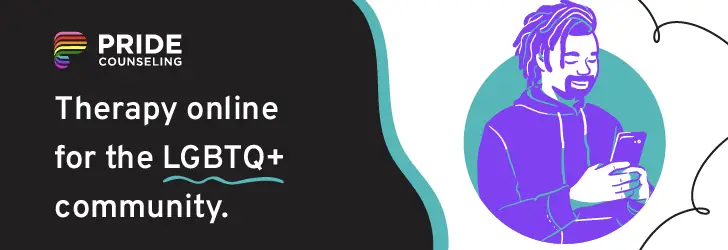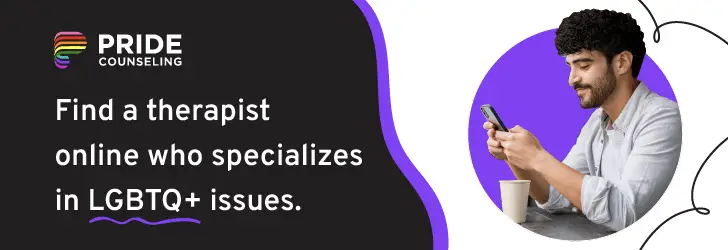To better understand therapeutic approaches beneficial for LGBTQ+ individuals, we sought insights from two professionals – a Psychotherapist and an Immigration Doctor. Discover the two effective methods they believe in.
- Affirmative Psychotherapy Strengthens Identity
- Affirmative Therapy Fosters Resilience and Self-Acceptance
1. Affirmative Psychotherapy Strengthens Identity
The one approach that I see making a big impact in the LGBTQ+ mental health world is affirmative psychotherapy. This type of therapy works by affirming the individual’s identity through advocacy and validation. While LGBTQ+ individuals seek treatment for similar reasons as everyone else, like anxiety, PTSD, and depression, their traumatic experiences, based on their identities, are an integral part of their treatment. In affirmative therapy practices, these identities are mindfully considered and praised to strengthen one’s self-esteem and encourage a better sense of self-worth. This is one of the biggest aspects of the healing process for individuals in this community.
Sydney Williams, Psychotherapist, Rose Wellness Counseling
Find Your Tribe at Pride: Embrace, Empower, and Celebrate Love Today!”
2. Affirmative Therapy Fosters Resilience and Self-Acceptance
Affirmative Therapy is a highly effective approach for LGBTQ+ individuals. It validates their sexual orientation and gender identity, reducing minority stress caused by societal discrimination. Therapists are culturally competent, addressing LGBTQ+ challenges. This therapy fosters resilience, self-acceptance, and positive self-esteem, helping clients navigate coming out and identity exploration. It aids families and partners in understanding and supporting LGBTQ+ loved ones, improving relationships. Affirmative Therapy tackles mental health issues prevalent in this community and empowers clients to advocate for their rights. It connects individuals with LGBTQ+ support networks, reducing isolation, and considers the intersectionality of identities. It creates a safe, empowering, and affirming space for LGBTQ+ individuals to lead healthier, happier lives.
Steven Gordon, Immigration Doctor, Steven Wittenberg Gordon MD
 Pro Insights: Enhancing LGBTQ+ Mental Health with Therapeutic Methods
Pro Insights: Enhancing LGBTQ+ Mental Health with Therapeutic Methods
Sometimes, the most effective therapies speak to our unique identities and experiences. Here are expert-recommended methods that can make a difference:
- Cultural Sensitivity Training for Therapists: Professionals working with LGBTQ+ individuals can benefit from training that helps them understand this community’s unique challenges and experiences.
- Incorporate Mindfulness Practices: Mindfulness can help in the process of self-acceptance and in coping with minority stress. It’s a tool that can be integrated into the therapeutic approach for effective outcomes.
- Use of Online Support Groups: In addition to traditional therapy, online forums can provide an additional layer of support and a sense of community, which is crucial for mental well-being.
- Focus on Intersectionality: Recognize that LGBTQ+ individuals may have multiple intersecting identities, such as ethnicity, and address these in therapy to provide comprehensive care.

Our Take: Making Space for Individual Journeys
We’ve heard from the professionals, and their insights are invaluable. But what about our perspective? We believe that the path to better mental health is deeply personal and that these approaches can offer a guiding light.
- Holistic Approach: Don’t just focus on one aspect of identity or a single issue; look at the individual as a whole person with unique needs and desires.
- Regular Check-ins: Mental health is a journey, not a destination. Frequent check-ins with your therapist or support network can make all the difference.
- Personalized Resources: Use books, podcasts, and other resources tailored to LGBTQ+ experiences to supplement your therapy and offer additional perspectives.
Remember, the journey to mental health is your own, and these tools are here to support you every step of the way. Whether you’re navigating complex identities or seeking to strengthen your resilience, there’s an approach that’s right for you. Keep exploring and stay empowered! ?
Get Expert Help for Your Unique Needs
Frequently Asked Questions
What is Affirmative Psychotherapy?
Affirmative Psychotherapy is a form of therapy that is culturally sensitive to the unique experiences and challenges of LGBTQ+ individuals. It aims to validate and strengthen the client’s identity, ultimately improving self-esteem and overall well-being.
How does Affirmative Therapy differ from general psychotherapy?
While general psychotherapy may treat individuals broadly, Affirmative Therapy focuses on the unique experiences and challenges of being an LGBTQ+ individual. It’s specifically designed to be inclusive and validating of LGBTQ+ identities.
Is Affirmative Therapy only for LGBTQ+ people?
Though designed with the LGBTQ+ community in mind, the principles of Affirmative Therapy—such as validation, strengthening identity, and fostering resilience—can benefit anyone who has felt marginalized or stigmatized.
Can Affirmative Therapy help families and partners of LGBTQ+ individuals?
Absolutely! One of the goals of Affirmative Therapy is to aid families and partners in understanding and supporting their LGBTQ+ loved ones, which can lead to improved relationships within the family unit.
Are online support groups effective?
Online support groups can be a great supplement to traditional therapy. They offer a community of people who share similar experiences, providing emotional support and resources that can be valuable in your mental health journey.
How can I find a culturally competent therapist?
Seek referrals from LGBTQ+ community centers or trusted individuals within your network. Websites like Psychology Today also let you filter therapists based on their LGBTQ+ competency.
Is it essential to focus on intersectionality in therapy?
Understanding the intersectionality of identities (such as ethnicity, religion, and gender) can provide a more comprehensive view of an individual’s experiences and challenges, making the therapeutic approach more effective.
How can I supplement my therapeutic experience?
You can further enrich your therapy by exploring personalized resources like books, podcasts, and mindfulness apps geared towards LGBTQ+ experiences and mental well-being.
Feel free to use these FAQs as a quick guide, but remember that therapy is a personal journey. Open dialogue with your healthcare provider can help tailor the approach that’s perfect for you. ?
About Jacob Maslow
After surviving the traumatizing events of 9/11, I took it upon myself to heal through helping others. I’m the primary caregiver of my children and understand from first-hand experience the lonely paths you have to walk as a partner and parent when leaving an unhealthy relationship.
We’re all echoing in a dark space that doesn’t have to be this empty, and that’s been my mission since finding solace and recovery in therapy: To help comfort others who are still in shock and at the prime of their struggle.
I came across BetterHelp after searching for this type of community. I wanted to belong to a body of proactive therapists and supportive therapy veterans that allowed me to see other sides of the story.
It was unconventional, and that’s what attracted me most. During my most challenging times, when my ex-wife completely cut me off from my children, I found comfort and clarity through BetterHelp.
Instead of being chained to a strict therapist recommendation, I was in charge of who I felt understood my struggle most. That allowed me to find my true peace, as I was reunited with those who read behind my words and had first-hand experience with my trauma.
Recovery is a choice; with BetterHelp, that choice will be a few clicks away. You can join their couples-oriented platform, Regain.us for those stuck with family estrangement and toxic relationship patterns.
- Stress Relieving Benefits of Spending Time in a Garden: Interesting Facts to Know - February 16, 2024
- How to Reduce Anxiety Immediately: Quick and Effective Techniques - February 15, 2024
- Can Stress Cause Bloating? Understanding The Link Between Stress And Digestive Issues - February 15, 2024
This site contains affiliate links to products. We will receive a commission for purchases made through these links.



 Pro Insights: Enhancing LGBTQ+ Mental Health with Therapeutic Methods
Pro Insights: Enhancing LGBTQ+ Mental Health with Therapeutic Methods


